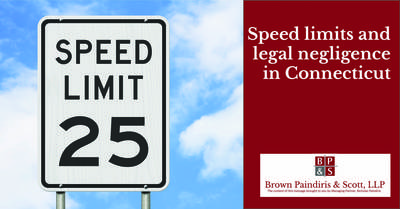CT speed limits and legal negligence
Contributed by Stephen Sobin
Did you know that your home state, Connecticut, passed the first speed limit law back in 1901? The first law of its kind in the United States limited the speed of motor vehicles in Connecticut to 12 MPH in cities and 15 MPH on country roads. Prior to this law, New York promulgated laws regulating the speed of non-motorized vehicles such as wagons, carts, or sleighs-to a gallop. New York then followed up with the world’s first comprehensive traffic code in 1903.

Later, in 1974, President Richard Nixon signed a national speed limit of 55 MPH in an effort to reduce the nation’s traffic fatality rate at the time. The law was successful in causing the fatality rate to drop.
While no one likes to be on the receiving end of a pricey speeding infraction, Connecticut’s traffic code was enacted to protect all drivers on our roadways. Here, at Brown Paindiris & Scott, LLP, we also use the code to allege “negligence per se” against tortfeasors that have caused injury to our clients in a motor vehicle accident. Put simply, negligence per se stands for the proposition that someone else’s violation of a State traffic statute can serve as evidence that the violator breached their duty of care to you. While not a cause of action in its own right, it is certainly a useful evidentiary tool to prove liability against the individual that harmed our client. Once liability is determined and/or accepted, we are able to better focus on damages.
Motor vehicle accidents often have the potential to result in significant, life-altering injuries. This is especially true in high-speed motor vehicle accidents. The injuries can be permanent in nature and, if the injured party is not zealously represented during this process, may result in a financial burden for the injured party and his/her family.
If you’ve been in a car accident and have questions about whether you have any legal recourse, contact Brown Paindiris & Scott for a free consultation today!






